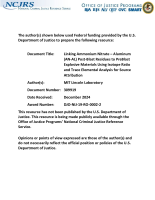Mapping Technologies for Crime Scenes
Low-cost computing power and capture devices, as well as advances in machine learning tools, allow for rapid and affordable photogrammetry tools. These tools dramatically improve crime scene documentation by producing highly accurate, three-dimensional representations of crime scenes in high resolution.
This webinar was presented by the NIJ Forensic Technology Center of Excellence on October 14, 2021.
See the YouTube Terms of Service and Google Privacy Policy



